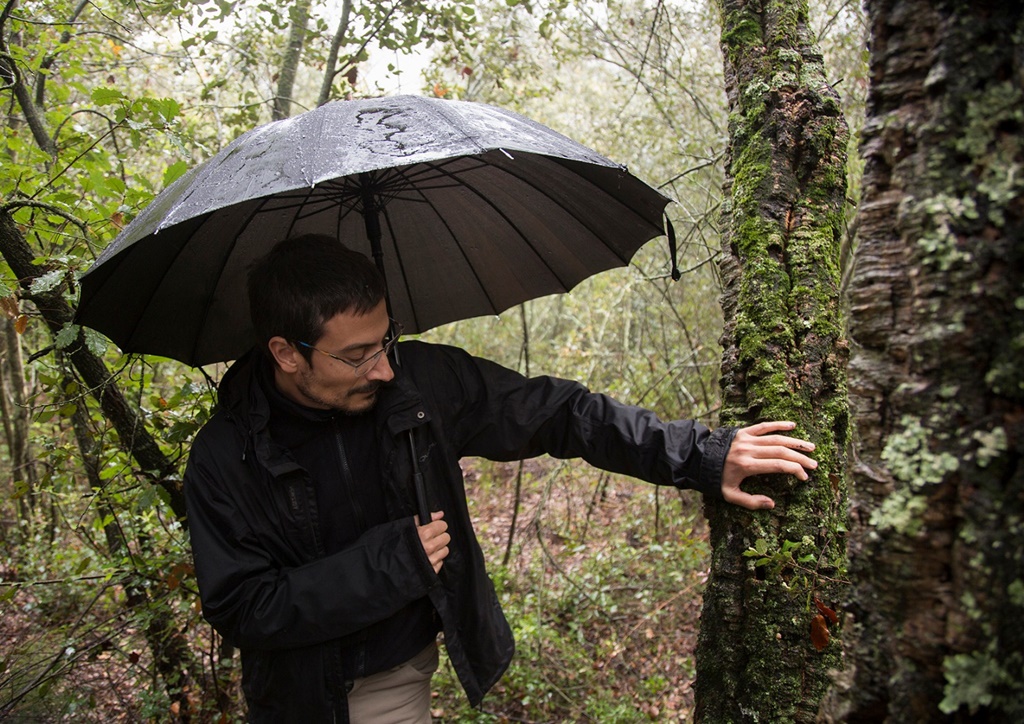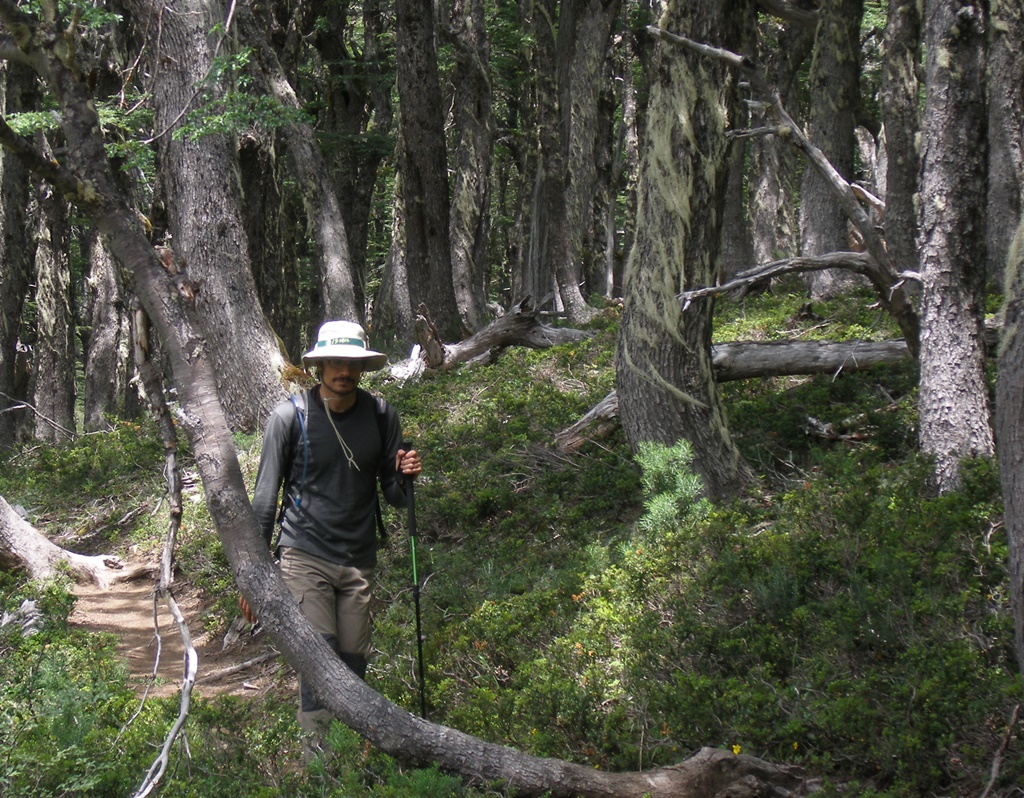Miquel de Cáceres, the biologist enthrilled by computers and mathematics
Miquel de Cáceres' spontaneity literally springs to life when asked why he studied biology. And he gives the answer with an overwhelming naturalness that falls like lead: "because of Ramon Margalef, without any doubt". He recalls how he was influenced as a teenager by the popular books of this leading ecologist, especially 'Blue Planet, Green Planet': "they have an apparently simple discourse, but it is not at all". And he recalls how he fell in love with biology back then, thanks to the contagious passion transmitted by a teacher. Apart from biology, computers and mathematics are his passions, probably in that order. "I belong to a generation that started to have computers at home and I started programming when I was 15 years old. There were very few of us, four 'geeks' who got into it". Biology was still a reference and, for this reason, once at university he plunged into forest ecology, limnology and theoretical ecology, as he still remembers today.
"Without a doubt, I studied biology because of Ramon Margalef: his book 'Blue Planet, Green Planet' has an apparently simple discuourse, but it is not simple at al".
MIQUEL DE CÁCERES, head of CREAF'S Ecosystem Modelling Facility

His first scientific experience after graduating in biology was to do his doctoral thesis in molecular modelling, although his strength there was once again his knowledge of computer programming. "Mathematical skills in a biologist are rare," he says, "and that's why my hobby opened professional doors for me... but in directions that were not fulfilling enough. What does appear clearly with the thesis is the word modelling, which today links and gives meaning to all his discourse thanks to the fact that he has managed to unite it with ecology: since 2021 he has been coordinating CREAF's Ecosystem Modelling Facility (EMF), a small unit specialising in statistical modelling, a simplified and mathematical way of approaching reality that allows predictions to be made. The creation of the EMF and the hiring of Miquel de Cáceres has been possible thanks to the Severo Ochoa program.
A passionate biologist who has been programming computer code since the age of 15: a rare combination that has led him to modelling in order to make predictions about ecological systems.
"I have found a task which, if it goes well, will give me a lot of fun". And having fun is the result of connecting process modelling (which he already developed at the Forestry Technology Centre of Catalonia) with day-to-day research at CREAF. "It allows me to enrich myself with the knowledge of my colleagues; I need to establish collaborations and make sure that the tools we develop are useful for their research", he explains.
The modelling dream team
Miquel de Cáceres' structured discourse suddenly switches to the plural and, from then on, he only talks about the team, the we that represents the 3 colleagues that make up the Ecosystem Modelling Facility. And he explains in detail the versatility of a group that includes Víctor Granda and Roberto Molowny. Of Granda, he highlights his fascination for computer science, which led him to leave biology research once he had presented his doctoral thesis: "he is very good at programming... perhaps due to the influence of his father, who specialised in hardware". And of Molowny, he notes that he is a physicist, with a thesis in astrophysics, "and of the three of us, he knows the most mathematics, the most physics and the most statistics".
"Victor Granda, Roberto Molowny and I (the members of the EFM) are not afraid of numerical questions, we know how to programme, we have a quantitative background and that is positive. We have complementary profiles, we can do great things together with common objectives"
MIQUEL DE CÁCERES
He admits he has been a bit of a latecomer, because he has been doing research in forest ecology and has been coordinating the Ecosystem Modelling Facility for a year in a hybrid role between research and technical support. "Victor Granda, Roberto Molowny and I are not afraid of numerical issues, we know how to programme, we have a quantitative background and that is why we contribute, and that is a positive thing. We have complementary profiles, we can do great things together with common objectives". And of himself he emphasises: "I have programmed for many years, I am not a computer scientist but I have algorithmic in my head". Their great challenge as a team: to continue supporting, to participate in projects where there is added value and to continue promoting their own developments.

His speech is full of rhetorical questions that he quickly answers in a didactic and orderly manner. As if he assumed that modelling and statistics are abstract and should be clarified. He is dedicated to modelling processes after focusing on statistics applied to ecology as a predoctoral fellow and then as a postdoctoral fellow in Canada.
He distinguishes between statistical modelling (analysing data to extract information about patterns), and modelling that develops tools to make predictions about the functioning of an ecological system. "With the first one, I got recognition through scientific citations, but it gave me the dissatisfaction of not having a system of study," he recalls. And this is why he has specialised in modelling processes. "On the one hand, it is very hard, because I have to learn about and integrate many areas of research and learn how processes work in ecological systems. But on the other hand, I work mainly with forests and this allows me to think about what is going on in the canopy with the intersection of rainfall, to monitor roots... I now have a stronger link between my life experience and my work". Modelling ecological processes, then, puts biology first, in close collaboration with computers and mathematics.
A scientist who models
Models complement experimentation, which is expensive. And they have a multiplicity of uses, from which CREAF's different areas of research benefit.
The multiplicity of uses of models in research ranges from checking how an ecological process interacts with other processes, to devising applications for transferring knowledge. "Models complement experimentation, which is expensive," he specifies, "which is why CREAF's different areas of research can benefit from them". One of the examples of transfer is forecasting the risk of fire, based on predictions about the variation of humidity in vegetation. "It is relevant because it's a way of having an impact, of connecting with reality. I feel it's useful not only because it advances research, but also because decisions are made on the basis of the information we provide".
The constant collaboration with different areas of knowledge is also part of the work that catches his attention. "The advantage of models is that they integrate knowledge from different fields, mathematically formalised to perform quantitative calculations". The professional decision to evolve from statistics applied to community ecology to the modelling of forest processes allowed him to develop a study system, applicable to the forest, at the plot or catchment scale.
"I feel like a scientist, although it's a question I've been asking myself for 20 years".
MIQUEL DE CÁCERES
When asked if he considers himself a scientist, he answers yes, he feels identified with it. "It's a question I've been asking myself for 20 years," he confesses. "I like the activity of research, although the research I do is very much geared towards generating tools for others to research. I write scientific articles, but not all of them answer a question about how nature works. I consider myself a scientist but I might not be one. I am more aware of it now, because my work is much more linked to forests and their processes. But those of us who deal with numbers are a bit special, I think".
This action is part of the Severo Ochoa “ULandscape” funded in 2019 by the Agencia Estatal de Investigación of the Spanish Ministry of Science and Innovation to support Research Centres of Excellence.







